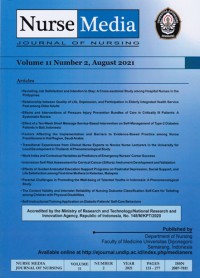
Jurnal
Effect of a Ten-Week Short Message Service-Based Intervention on Self-Management of Type-2 Diabetes Patients in Bali, Indonesia
Background: Diabetes mellitus is a chronic disease that may pose serious complications if poorly managed. The application of mobile technology (m-health) ranging from simple to more complex programs in diabetes management has the potential to foster patients’ active involvement in their care. However, the evidence of m-health effectiveness on the self-management of type-2 diabetes patients in low- and middle-income countries is still mixed.
Purpose: To evaluate the effect of a ten-week short message system (SMS)-based intervention (Tweek SMSDM) on self-management of type-2 diabetes patients.
Methods: A quasi-experimental study was performed in two groups. The intervention group (n=30) received additional daily automated messages to enhance their diabetic self-care practice, while the control group (n=30) continued to follow the standard program only. Pre- and post-intervention data were measured in both groups using the Indonesian version of the Summary of Diabetes Self-Care Activities (SDSCA) questionnaire. T-test, Mann-Whitney, Wilcoxon Signed-Ranks, McNemar and Fisher exact tests were carried out to analyze the data.
Results: After ten weeks, the intervention group showed significant mean changes in the domains of general diet (0.42±1.08; p=0.034), specific diet (1.75±1.42; p=0.0001), exercise (1.02±1.85; p=0.005), blood-glucose testing (0.53±1.67; p=0.009), and foot care (4.75±2.51; p=0.001) before and after the intervention, while the control group did not. This study also found significant differences in the mean scores for each domain of the SDSCA between the intervention and the control groups (p
Availability
No copy data
Detail Information
- Series Title
-
Nurse Media Journal of Nursing, Vol. 11 No. 2 August 2021
- Call Number
-
(05) 610.5 DEP n
- Publisher
- Semarang : Department of Nursing, Faculty of Medicine Diponegoro University., 2021
- Collation
-
Hlm. 177-186
- Language
-
English
- ISBN/ISSN
-
2087-7811
- Classification
-
(05) 610.5 DEP n
- Content Type
-
-
- Media Type
-
-
- Carrier Type
-
-
- Edition
-
Vol. 11 No. 2 August 2021
- Subject(s)
- Specific Detail Info
-
-
- Statement of Responsibility
-
-
Other version/related
No other version available
File Attachment
Comments
You must be logged in to post a comment
 Computer Science, Information & General Works
Computer Science, Information & General Works  Philosophy & Psychology
Philosophy & Psychology  Religion
Religion  Social Sciences
Social Sciences  Language
Language  Pure Science
Pure Science  Applied Sciences
Applied Sciences  Art & Recreation
Art & Recreation  Literature
Literature  History & Geography
History & Geography